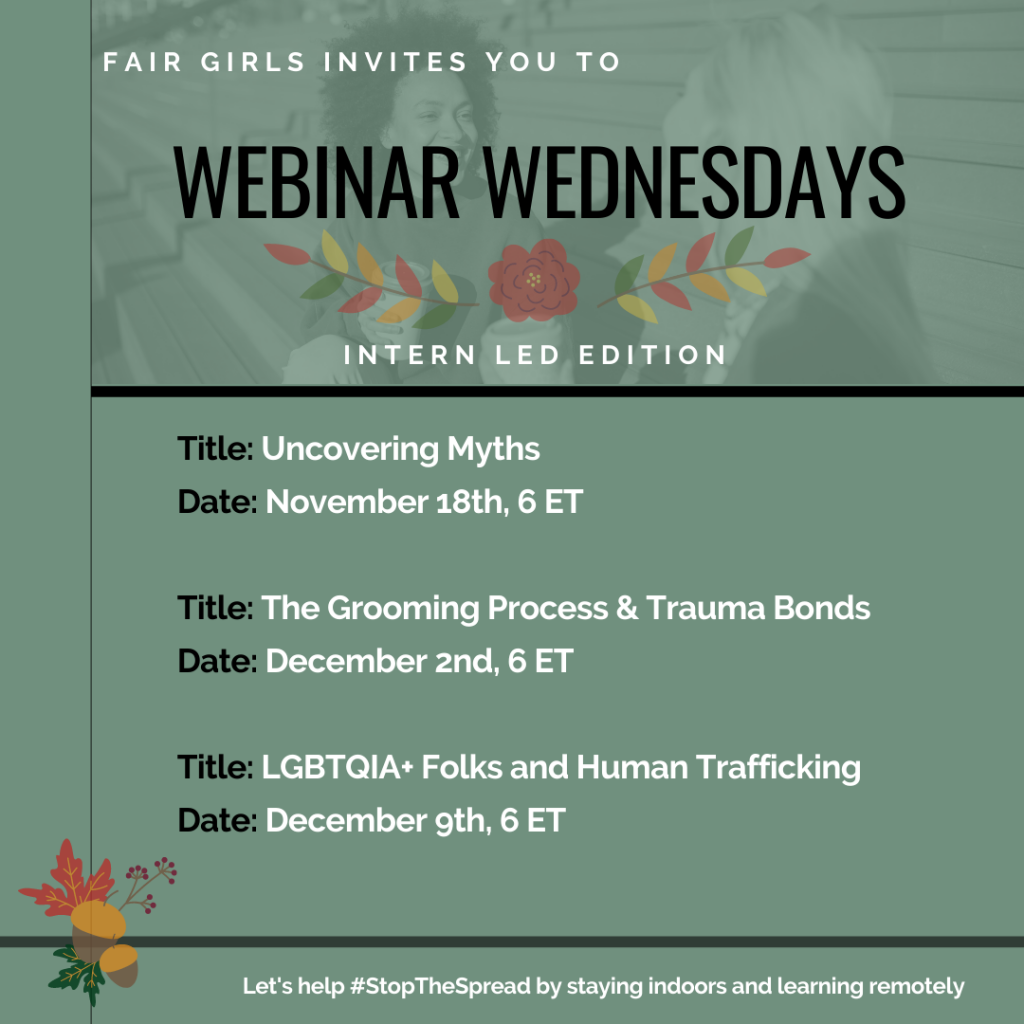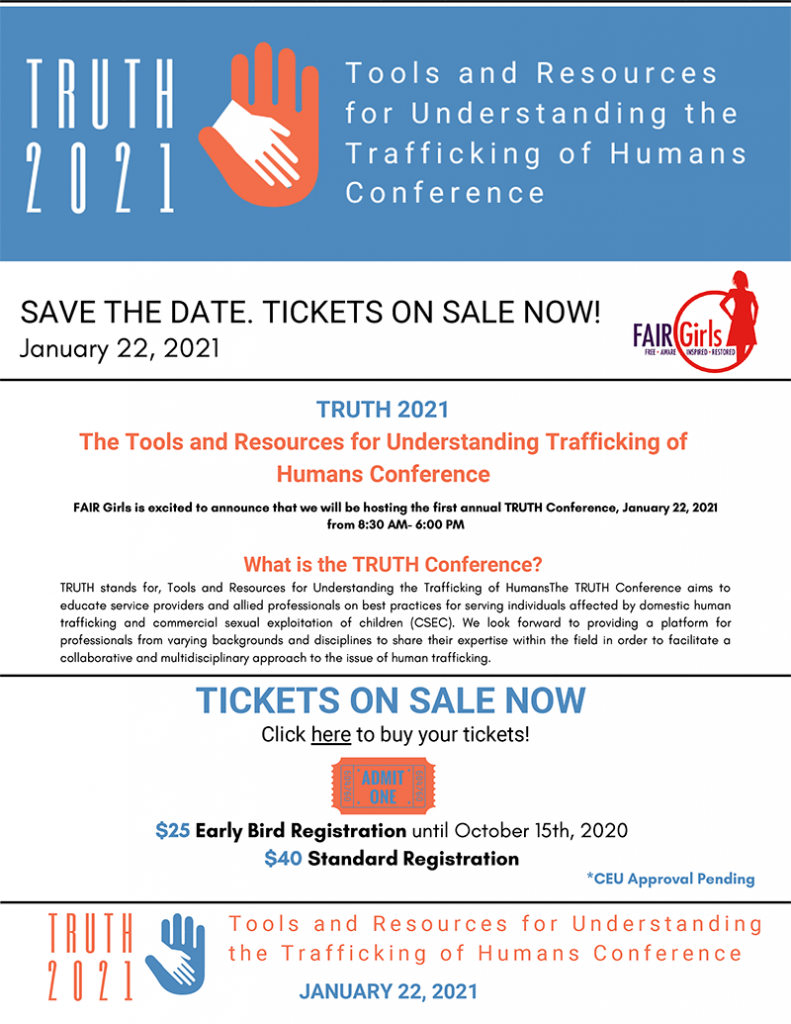According to the World Bank, 75% of the world’s population has access to a mobile phone. Additionally, 4.3 billion people use social media of some kind. A Pew Research study found that in the United States, 95% of teens between the ages of 13 and 17 have access to a smartphone and 45% reported that they are online on an almost constant basis. The interconnectedness made possible by the internet certainly has its benefits; it is easier to keep in touch with friends and family, shop online, and remain up to date on current events and news from around the world. We are able to connect with those we do know, but we are also a click away from those we don’t—a new reality that is inherently dangerous, especially for vulnerable youth. Kids and teens often recognize to be alarmed when a stranger approaches them in person, yet this instinct does not always translate to online interactions due to the “anonymous” culture of the internet. In fact, a study by the National Society for the Prevention of Cruelty to Children found that 25% of school-age youth admitted they had live-streamed with a stranger on social media.
Traffickers have taken advantage of this new opportunity to privately and strategically access such a young, vulnerable population. Social media and the internet have facilitated marketplace expansion in nearly every realm of commerce. Unfortunately, this includes harmful and illegal activity such as selling humans for sex and child sexual abuse material online. With social media being such a significant part of youths’ lives around the world, they are vulnerable to traffickers who undoubtedly seek to exploit them on these platforms. eMarketer.com estimates that 5.7 million children worldwide under the age of 11 have Facebook, Instagram, or Snapchat accounts despite their age restrictions that are supposed to keep this young demographic from using them.
Online Sexual Exploitation
In recent years, traffickers have shifted their focus online to recruit sex trafficking survivors and advertise them to sex buyers. This may not always be an in-person sexual act; the internet has created an entire market for “webcam” or “cam shows” in which individuals perform live, interactive sexual acts on camera for buyers, who don’t even have to leave their couch to consume this product. However,coercing a survivor to engage in in-person sex work is still the most common form of sex trafficking through social media. Survivors do not have to be physically close to their trafficker in order to be exploited—they can be exploited through force, fraud and coercion without ever meeting their trafficker in person. A survey of domestic youth trafficking survivors by the non-profit Thorn in collaboration with Dr. Vanessa Bouché of Texas Christian University found that 42% of those who initially met their traffickers online never met them in person. These survivors are often manipulated through sextortion, which the FBI defines as “a serious crime that occurs when someone threatens to distribute your private and sensitive material if you don’t provide them images of a sexual nature, sexual favors, or money.”
The rate of online trafficking and pimps advertising survivors online is accelerating rapidly. Online advertising maximizes profits for traffickers, thus improving their business model. For example, 1 in 7 respondents in Thorn’s survey who were required to engage in sex work on the street reported more than 10 buyers per day. Comparatively, 1 in 4 respondents who were advertised online reported more than 10 buyers per day. Therefore, online advertising of sex is becoming more common as street sex work decreases. Before 2004, the main advertising method was on the street and just 38% of sex workers were advertised online. However, for those who entered the Life in 2004 or later, online advertising had increased to 75%. The most popular online platforms for advertising (according to those surveyed by Thorn) were Backpage, Craigslist, RedBook, SugarDaddy, and Facebook. Advertisements are certainly not limited to these sites.
Thorn’s study was completed before Backpage was shut down. While we know that some sex worker advocates indicate that street sex work is on the rise since the government shut down Backpage.com, we also know from working with survivors every day that new online platforms facilitating human trafficking pop up frequently to keep the billion dollar business going. Many traffickers simply switched to using other websites with servers outside of the United States instead of Backpage, according to NPR. This online shift reduces opportunities for street outreach intervention programs (such as the one FAIR Girls’ began this past year) and reduces opportunities to better identify potential survivors through open lines of communication and resources.
How do traffickers manipulate children online?
Thorn’s study found that 55% of minor sex trafficking survivors in the US who were trafficked in 2015 or later reported meeting their traffickers for the first time using text, a website, or an app. Traffickers seek out youth they perceive to be more vulnerable, such as those who post about troubles at home or indicators of low self-esteem. Scrutinizing an individual’s social media accounts gives a trafficker an opportunity to learn about their targets’ lives and vulnerabilities, and therefore manipulate them most effectively. Social media provides traffickers with anonymity—they can easily hide behind a screen and a fake profile to avoid revealing signs that they are dangerous to a victim. They can communicate freely with victims, as many parents do not closely monitor their child’s social media interactions or accounts.
Traffickers send potential victims flattering messages that make them feel heard and valued, such as “you are beautiful” or “I know how you feel.” They build rapport with youth and begin to gain their trust—they may even pose as potential dating partners (sometimes on dating sites such as Tinder, Grindr, OKCupid, or SeekingArrangement). They often promise to support the victim, give them gifts, and help them “escape” their troubles. Additionally, traffickers occasionally pose as someone recruiting nannies, models, dancers, or for another kind of job to lure potential victims to travel to meet with them.
If a youth has few people in their life who support them, this online persona who makes them feel special becomes their replacement support system. Eventually, a trafficker will escalate the relationship, lure a victim to meet in person, manipulate them into “supporting” the trafficker in return for the trafficker’s attention, gifts, or love—from here it’s a quick entry into the Life. However, in some cases traffickers may never meet with their victims in person and instead use forms of sextortion to ensnare and manipulate them. Threats and coercion do not need to be conveyed in person to have a powerful hold on a survivor.
What can be done?
Promoting online safety is more important than ever! Teachers and parents can promote safe usage of technology in a non-judgemental way to youth. While acknowledging that social media can be a positive thing, we all can relay age appropriate information to youth about the dangers of the internet such as body image issues, cyber bullying, sextortion and human trafficking. Framing these conversations so that they are not fear based and emphasizing that these negative scenarios may never happen to them specifically make them more effective. The conversation can always be framed to say that this critical information is not only to help them stay safe but also to empower them to help a friend that they might see in trouble. Encouraging youth to keep their profile settings on private, turn off their location services, not post on social media until they leave a location, and not accept requests from people they do not know can protect them. Parents and guardians should discuss with and fully utilize parental controls available on the online platforms that the youth they live with access. We should be reminding youth that anything they share on the internet or via text or social media is no longer theirs and it lives out there forever—it can be screenshotted and spread without their consent or knowledge.
Efforts to prevent child sexual exploitation online extends beyond direct conversations with young people. Some social media platforms such as Facebook claim to actively monitor their sites to prevent child sexual exploitation and abuse material, although their protocol is not always clear. However, some others like Tik Tok turn a blind eye and do not have adequate privacy measures or community guidelines. Now that 1.5 billion young people have been affected by school closures worldwide due to COVID-19, there is a heightened risk of online sexual exploitation on account of more children being online for distance learning. Some ways that we can counter the potential dangers of this increased online presence are creating parental controls for all youth social media accounts, for social media platforms to better and regularly train content moderators or using PhotoDNA by Microsoft. PhotoDNA works to identify child victims by examining photos uploaded to the platform and cross checking them against known child sexual abuse material from child pornography websites and online sex marketplaces.
However, there are no comprehensive and cohesive laws that require social media platforms and chat room sites—in which we have seen increased exploitation, grooming, and recruitment even before COVID—to comply with these important preventative measures. FAIR Girls supports increased accountability and transparency from providers of social media sites and online platforms. Currently, there is proposed legislation titled the “EARN IT (Eliminating Abusive and Rampant Neglect of Interactive Technologies) Act of 2020” that addresses this issue. If enacted, it would establish a National Commission on Online Child Sexual Exploitation Prevention led by the Attorney General that would be tasked with recommending best practices to providers of social media sites to prevent the online sexual exploitation of children. If companies certify that they have implemented the best practices prevention practices approved by the National Commission, they may be protected from civil and criminal liability for conduct on their sites that violates certain provisions of federal criminal law. Currently, how safe a social media or online platform is from detecting and preventing online child sexual abuse and exploitation is largely in the hands of private companies looking to profit by turning a blind eye, but the EARN IT Act could change that. Creating incentives for these social media and online companies to do their part to make their sites safer, is one step in the right direction. However, while it is incumbent upon all social media platforms to put adequate controls to prevent, identify, and report child sexual exploitation into place, it is also the responsibility of parents, guardians, schools, faith-based youth groups, and the community in general to utilize those preventive measures and to continue to raise awareness around this issue, through demanding that local schools and youth programs implement prevention education curriculums, such as FAIR Girls’ “Tell Your Friends,” for all middle school aged youth and above to ensure that we are providing our communities’ youth with the tools they need to stay safe from manipulation, recruitment and exploitation online.


